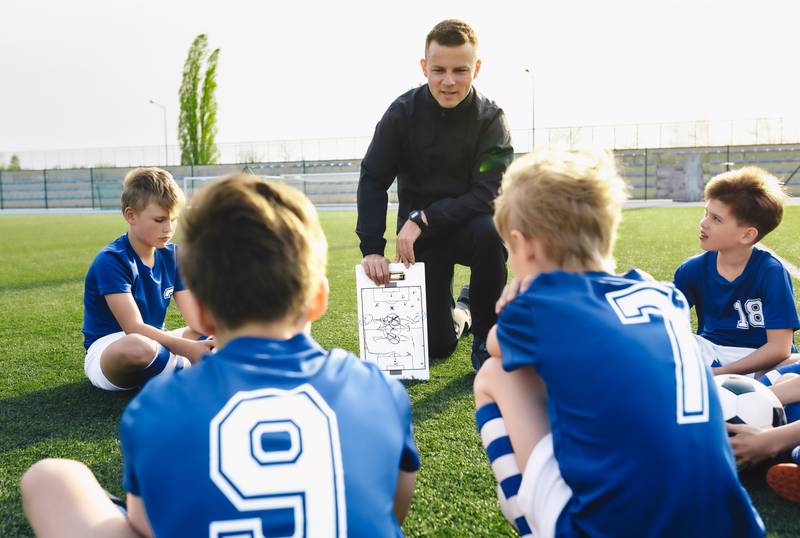Football coaching at the grassroots level forms the foundation of player development across the UK. Dedicated volunteer coaches work tirelessly with young players, creating environments where skills are nurtured and love for the beautiful game takes root. Effective grassroots coaching combines technical instruction with creating positive, inclusive experiences that keep players engaged and developing at their own pace.
The journey of a grassroots football coach can be immensely rewarding yet challenging. Many coaches balance limited resources and facilities while striving to deliver quality sessions that develop both football skills and character. Modern grassroots coaching emphasises fun, participation and skill development over winning at all costs—a philosophy endorsed by football associations throughout the UK.
Today's grassroots coaches benefit from an unprecedented wealth of resources, from FA-approved drills to online communities where coaching ideas are shared. What was once called soccer in some regions is now supported by structured coaching pathways and digital tools that help even novice coaches deliver effective sessions. These resources empower coaches to create engaging, age-appropriate training that develops well-rounded players while fostering a lifelong passion for football.
Fundamentals of Grassroots Football Coaching
Grassroots football coaching forms the foundation of player development and requires a special approach focused on inclusivity, enjoyment and building fundamental skills. The cornerstone of effective grassroots coaching lies in understanding its unique philosophy and implementing developmentally appropriate principles.
Understanding Grassroots Philosophy
Grassroots football is defined as the amateur or basic level of the sport, distinct from professional settings. It serves as the entry point for young players beginning their football journey. The philosophy centres on creating a positive environment where all participants feel welcome regardless of ability.
A successful grassroots coach acts as both mentor and role model. Children often look up to their coaches, making it essential to demonstrate positive behaviours and attitudes.
The primary focus should be on fun and participation rather than competitive outcomes. Research shows that children who enjoy their early experiences are more likely to continue playing long-term.
Inclusivity stands as a non-negotiable element in grassroots coaching. Every child deserves equal attention and development opportunities, creating a space where diverse abilities are celebrated.
Key Principles of Youth Soccer Development
Developing young footballers requires age-appropriate training sessions that account for physical and cognitive development stages. Sessions should be designed to be engaging, educational and enjoyable.
Technical fundamentals must be prioritised over tactical complexity. Young players need to master basic skills like passing, dribbling and ball control before advancing to more sophisticated concepts.
Small-sided games (4v4, 5v5) offer the ideal learning environment as they increase ball touches and decision-making opportunities. These modified formats allow children to experience success more frequently.
The STEP framework (Space, Task, Equipment, People) provides a useful structure for designing progressive training activities:
- Space: Adjust area size to create appropriate challenges
- Task: Modify rules to suit player abilities
- Equipment: Use appropriate ball sizes and equipment
- People: Vary group sizes and team arrangements
Praise effort and improvement rather than just outcomes. This growth mindset approach encourages resilience and a willingness to try new skills without fear of failure.
Developing Football Skills at the Grassroots Level
Developing fundamental football skills requires a systematic approach that focuses on technique, understanding, and consistent practice. Young players need both individual skill development and an introduction to how these skills work within a team framework.
Shooting Techniques for Young Players
Teaching proper shooting techniques begins with foot positioning. Players should approach the ball at a slight angle, planting their non-kicking foot beside the ball while keeping their body over it.
For power shots, encourage players to strike through the middle of the ball with the laces of their boots. For accuracy, they should use the inside of their foot and follow through towards the target.
Create simple drills like stationary shooting, moving shots, and shooting after dribbling. These progressively build confidence and technique.
Ensure young players understand the importance of head position and body balance. Looking at the target before shooting significantly improves accuracy.
Remember to celebrate effort rather than just successful goals. This builds confidence in grassroots settings where skill development trumps results.
Introduction to Team Tactics
Team tactics at grassroots level should focus on spatial awareness and basic positional play. Start with simple concepts like maintaining width in attack and compactness in defence.
Use small-sided games (4v4 or 5v5) to help players understand their roles within a team structure. These games provide more touches and decision-making opportunities than full-sided matches.
Introduce the concept of triangles – having three players positioned to create passing options. This fundamental pattern appears throughout football at all levels.
Basic attacking principles should include:
- Supporting teammates who have the ball
- Creating space by moving away from congested areas
- Looking for forward passing options when possible
Defensive tactics can focus on staying goal-side of opponents and working together to win the ball. At the grassroots level, coaching these concepts through fun games rather than complex drills keeps young players engaged while they learn the tactical elements of soccer.
Organising Effective Training Sessions
Effective training sessions are the backbone of player development in grassroots football. Well-structured sessions maximise learning opportunities while keeping players engaged and motivated throughout their development journey.
Designing Engaging Drills
When creating drills for grassroots football, prioritise activities that ensure maximum ball contact for all participants. Design practices that replicate game scenarios rather than isolated technical exercises without context.
Players learn best when they're having fun, so incorporate competitive elements like small-sided games that naturally encourage decision-making and skill application.
Consider the 'Three Rs approach': Review previous learning, Revisit key skills, and Reinforce through game-related activities. This creates a logical progression that helps young players build confidence.
Age-appropriate challenges are crucial. For younger groups, focus on fundamental movement skills and basic ball control. For older youth, introduce more tactical elements while maintaining high engagement levels.
Create a library of adaptable drills that can be modified based on player numbers, weather conditions, and available space. This flexibility ensures sessions remain productive regardless of circumstances.
Management of Training Time and Resources
Efficient time management begins with thorough planning. Prepare session plans with clear objectives, but remain flexible enough to adapt if activities aren't working as intended.
Limit transition time between activities by setting up multiple stations beforehand. Using colour-coded equipment and consistent visual cues helps players quickly understand expectations.
A typical 60-minute session might follow this structure:
- 10-15 minutes: Warm-up with ball
- 20-25 minutes: Skill development
- 20-25 minutes: Game-related practice
Maximise participation by avoiding queues and eliminating elimination games. Instead, create practices where everyone stays active throughout.
Make creative use of limited resources. Small areas can be ideal for improving close control, and minimal equipment can be repurposed for various activities.
Consider the weather and daylight hours when planning, especially during winter months when many grassroots teams face challenging conditions. Having indoor alternatives ready shows professional foresight that parents and players appreciate.
Legal and Ethical Considerations in Grassroots Coaching
Football coaching at the grassroots level carries significant legal and ethical responsibilities that extend beyond teaching skills and tactics. Coaches must prioritise player welfare, obtain proper consent, and maintain appropriate qualifications to ensure a safe and positive environment for all participants.
Ensuring Player Safety and Consent
Player safety forms the cornerstone of ethical grassroots coaching. Coaches must conduct proper risk assessments of training facilities and implement appropriate safety protocols during all sessions. This includes regular equipment checks and ensuring suitable playing surfaces.
Obtaining informed consent is legally required before involving players in any football activity. For youth players, this means securing written permission from parents or guardians. These forms should clearly outline potential risks, emergency procedures, and medical information.
Coaches should maintain accessible first aid facilities at all training sessions and matches. The Football Association recommends that at least one coach per team holds a current first aid qualification.
Incident reporting procedures must be established and followed consistently. Any injuries or safety concerns should be documented properly and communicated to relevant parties.
Requirements for Qualified Coaches in Canada
In the UK, all grassroots football coaches must meet specific qualification requirements established by The Football Association. These typically include completing the FA Level 1 coaching certificate as a minimum standard for working with teams independently.
DBS (Disclosure and Barring Service) checks are mandatory for all coaches working with young people or vulnerable adults. This screening process helps identify individuals who may pose a risk to players.
Coaches must adhere to the FA's Code of Conduct, which emphasises respect for officials, appropriate behaviour, and promoting fair play. Regular continuing professional development is expected to maintain and update coaching standards.
Safeguarding training is compulsory for all coaches. This ensures they understand their responsibilities regarding child protection and can recognise signs of potential abuse or neglect.
While sometimes called "soccer" internationally, football coaching standards in the UK are among the most comprehensive globally, setting a high benchmark for grassroots development.
Show less










